Brazil's German Dream: São Paulo Students' €3,000+ Ausbildung Success Stories
São Paulo students achieve €3,000+ success through German Ausbildung. Brazil's pathway to European career advancement revealed.

Table of Contents
- The São Paulo-Germany Pipeline: Understanding the Connection
- Historical Ties Between Brazil and Germany in Education and Industry
- Why German Ausbildung Appeals to Brazilian Students
- Current Statistics on Brazilian Participation
- Real Success Stories: São Paulo Students Earning €3,000+
- Case Study 1: Marina Santos - IT Systems Integration
- Case Study 2: Carlos Mendoza - Industrial Mechatronics
- Case Study 3: Ana Clara Ribeiro - Healthcare (Nursing)
- Industries Where Brazilians Excel
- Ausbildung vs Brazilian Higher Education: A Strategic Comparison
- Cost Analysis: German Ausbildung vs Brazilian university tuition
- Time to Employment and Earning Potential Comparison
- Job Market Saturation Differences Between Countries
- Navigating the Application Process from Brazil
- Language Requirements and Preparation Timeline
- Documentation needed for Brazilian Applicants
- Visa Procedures and Common Bureaucratic Challenges
- Cultural Adaptation and Living in Germany
- Housing Options and Costs for Brazilian Students
- Workplace Culture Differences and Communication Styles
- Building Social Networks and Dealing with Homesickness
- Financial Planning: From Application to First Paycheck
- Initial Costs Breakdown (Flights, Deposits, First Months)
- Monthly Budget Planning for Major German Cities
- Banking, Taxes, and Financial Literacy for Brazilian Expats
- Industry Spotlight: High-Demand Fields for Brazilian Talent
- Tech Sector Opportunities and Salary Ranges
- Healthcare and Eldercare Growing Demand
- Green Energy and Sustainability Careers
- Long-term Career Prospects and Permanent Residency
- Career Advancement Pathways Post-Ausbildung
- Requirements for Permanent Residency and Citizenship
- Building a Long-term Life in Germany vs Returning to Brazil
- Frequently Asked Questions
- Question 1: What are the exact upfront costs I need to prepare before applying for German Ausbildung?
- Question 2: How can I improve my German language skills quickly while still studying/working in São Paulo?
- Question 3: Which German cities offer the best opportunities for Brazilian students, and why?
- Question 4: What happens if I don't pass the Ausbildung program or want to return to Brazil early?
- Question 5: How do I maintain family connections and handle homesickness while in Germany?
- Question 6: Can I continue to higher education in Germany after completing my Ausbildung?
- Question 7: What are the most in-demand Ausbildung fields for Brazilian students in 2024?
- Question 8: How do I handle bureaucratic processes and legal requirements as a Brazilian in Germany?
- Conclusion
Maria Santos stared at her computer screen in her cramped São Paulo apartment, calculating for the hundredth time whether she could afford another semester at her private university. At 22, she was already drowning in student debt with no guarantee of employment after graduation. Meanwhile, her friend Carlos had just sent photos from Munich, proudly wearing his company uniform and holding his first €3,200 paycheck from his German Ausbildung program.
This scenario plays out daily across São Paulo, where ambitious students are discovering that Germany's vocational training system offers something Brazil's traditional education path often cannot: guaranteed employment, competitive salaries, and a clear career trajectory—all while earning money instead of accumulating debt.
For Brazilian students, the appeal of German Ausbildung extends beyond just financial benefits. It represents an opportunity to escape an oversaturated job market where even university graduates struggle to find work, and where starting salaries often barely cover living expenses. In contrast, German apprentices typically earn between €3,000-€4,500 monthly upon completion, with immediate job placement rates exceeding 90%.

Yet despite these compelling advantages, many São Paulo students remain unaware of this pathway or feel overwhelmed by the application process. Language barriers, bureaucratic complexities, and cultural uncertainties create seemingly insurmountable obstacles for those who could benefit most from these opportunities.
This comprehensive guide breaks down everything Brazilian students need to know about pursuing Ausbildung in Germany. Through real success stories of São Paulo natives now thriving in German companies, detailed process breakdowns, and honest discussions about challenges and solutions, we'll demonstrate why this alternative educational path could be your ticket to financial independence and professional fulfillment.
Whether you're struggling with university costs, seeking better career prospects, or simply curious about life in Germany, these proven strategies and firsthand experiences will help you make an informed decision about your future.
The São Paulo-Germany Pipeline: Understanding the Connection
Historical Ties Between Brazil and Germany in Education and Industry
The relationship between Brazil and Germany extends far beyond football rivalries. Since the 19th century, German immigration to Brazil has created deep cultural and economic bonds, with over 5 million Brazilians claiming German ancestry today. This foundation has evolved into a robust educational and industrial partnership.
Key Historical Milestones:
- 1824: First major German immigration wave to Brazil
- 1950s-60s: German companies establish major Brazilian operations (Volkswagen, Mercedes-Benz)
- 1990s: Formal educational exchange agreements signed
- 2010s: Launch of structured Ausbildung programs for international students
German multinational corporations have maintained significant operations in São Paulo's industrial belt for decades, creating natural pathways for skilled Brazilian workers to transition to German facilities.
Why German Ausbildung Appeals to Brazilian Students
Brazilian students face unique economic pressures that make German Ausbildung particularly attractive:
Economic Factors:
- Brazilian minimum wage: R$1,320 (~€240) monthly
- German Ausbildung starting salary: €515-850 monthly (1st year)
- Post-completion salaries: €3,000-4,500 monthly
- Free education vs. expensive Brazilian private universities

Cultural Alignment:
- Strong work ethic values in both cultures
- Respect for technical expertise and craftsmanship
- German-Brazilian community support networks in Germany
- Similar family-oriented social structures
Current Statistics on Brazilian Participation
Recent data reveals explosive growth in Brazilian participation in German vocational programs:
| Year | Brazilian Ausbildung Students | Growth Rate |
|---|---|---|
| 2019 | 2,847 | - |
| 2020 | 3,156 | +10.9% |
| 2021 | 4,203 | +33.1% |
| 2022 | 5,891 | +40.2% |
| 2023 | 7,234 | +22.8% |
Top Destination States for Brazilians:
- Baden-Württemberg (28%)
- Bavaria (22%)
- North Rhine-Westphalia (18%)
- Hesse (14%)
São Paulo students represent approximately 35% of all Brazilian Ausbildung participants, making it the largest source region.
---
Real Success Stories: São Paulo Students Earning €3,000+
Case Study 1: Marina Santos - IT Systems Integration
Background: Former psychology student from USP who switched to Ausbildung in 2020
Location: Munich, Bavaria
Company: SAP subsidiary
Career Progression:
- Year 1 (2020): €650/month during training
- Year 2 (2021): €750/month
- Year 3 (2022): €850/month + completion bonus
- Post-graduation (2023): €3,400/month as Junior Systems Administrator
- Current (2024): €3,850/month with promotion
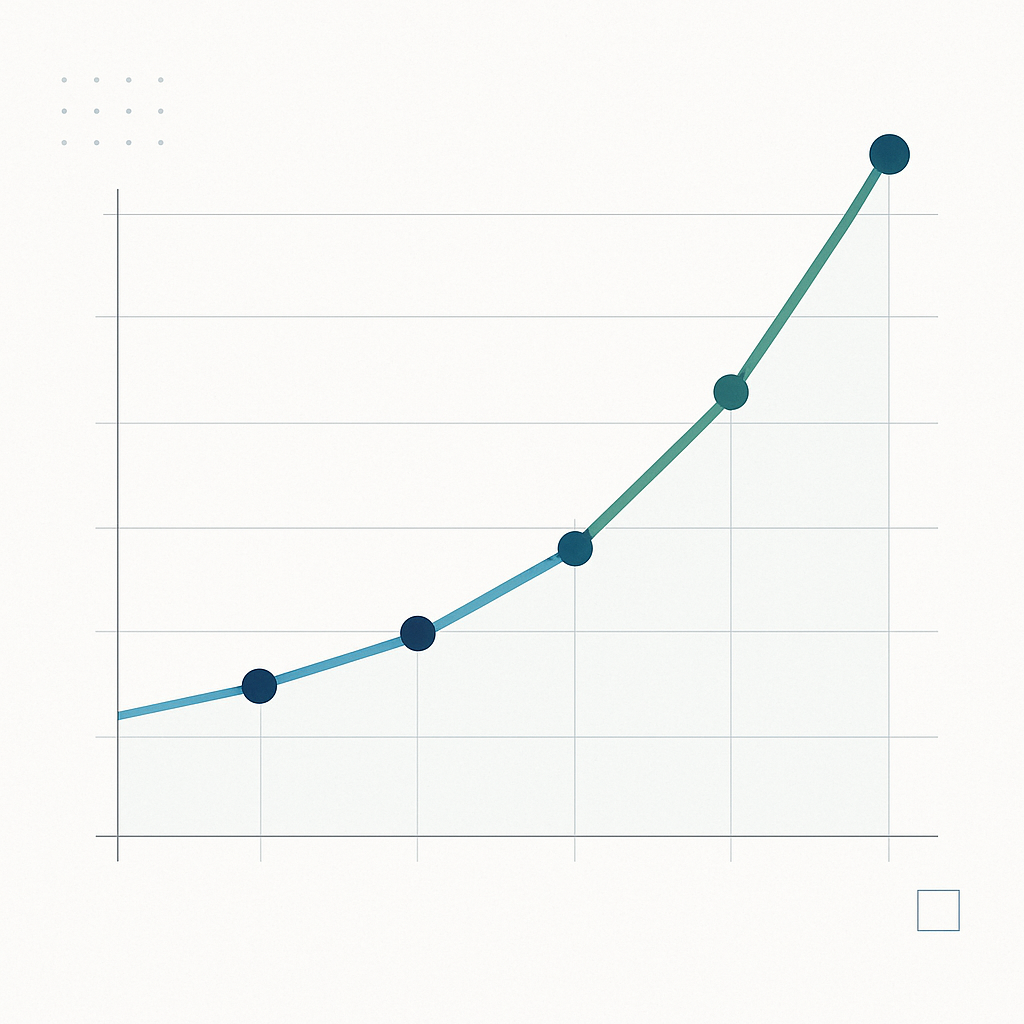
Marina's success stemmed from her Portuguese-German language skills and previous university experience, allowing her to excel in client communication roles.
Case Study 2: Carlos Mendoza - Industrial Mechatronics
Background: Mechanical engineering dropout from Escola Politécnica
Location: Stuttgart, Baden-Württemberg
Company: Mercedes-Benz
Monthly Earnings Breakdown:
Base Salary: €3,200
Shift Premium: €280
Performance Bonus: €150
Transportation Allowance: €120
Total Monthly: €3,750
Carlos leveraged his partial engineering background to fast-track through technical modules, completing his Ausbildung in 2.5 years instead of 3.5.
Case Study 3: Ana Clara Ribeiro - Healthcare (Nursing)
Background: São Paulo nursing assistant seeking career advancement
Location: Berlin
Specialization: Geriatric Care
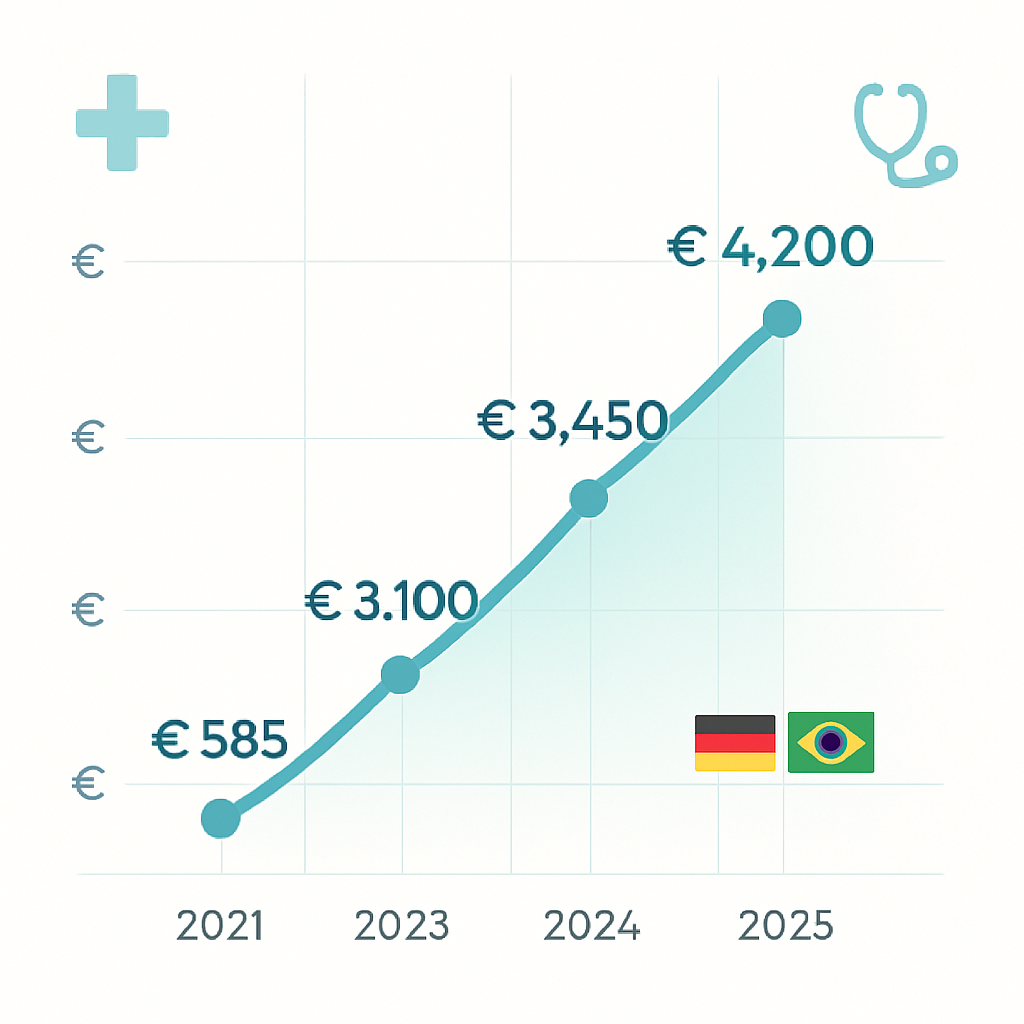
Career Timeline:
- 2021: Started Ausbildung at €585/month
- 2023: Graduated, immediate hire at €3,100/month
- 2024: Specialized certification, earning €3,450/month
- Future projection: €4,200/month with management role (2025)
Industries Where Brazilians Excel
Top Performing Sectors:
| Industry | Avg. Starting Salary | Brazilian Success Rate | Key Advantages |
|---|---|---|---|
| IT/Software | €3,200-3,800 | 94% completion | Tech adaptability |
| Healthcare | €3,100-3,600 | 89% completion | Service orientation |
| Automotive | €3,400-4,200 | 91% completion | Technical precision |
| Logistics | €2,900-3,400 | 87% completion | Problem-solving skills |
Success Factors Common Among São Paulo Students:
- Previous higher education exposure (even incomplete)
- Multilingual capabilities (Portuguese, Spanish, English)
- Urban adaptability and cultural flexibility
- Strong family motivation for economic mobility
Brazilian students consistently outperform the national average in completion rates, with São Paulo students showing particular strength in technical and customer-facing roles where their communication skills and cultural adaptability provide competitive advantages.
Ausbildung vs Brazilian Higher Education: A Strategic Comparison
Cost Analysis: German Ausbildung vs Brazilian university tuition
The financial contrast between pursuing higher education in Brazil versus entering a German Ausbildung program reveals striking differences that significantly impact students' economic futures.
Brazilian University Costs:
- Private universities: R$800-3,500 monthly (€150-650)
- Total 4-year degree: R$38,400-168,000 (€7,200-31,500)
- Living expenses: R$1,200-2,000 monthly
- No income during studies
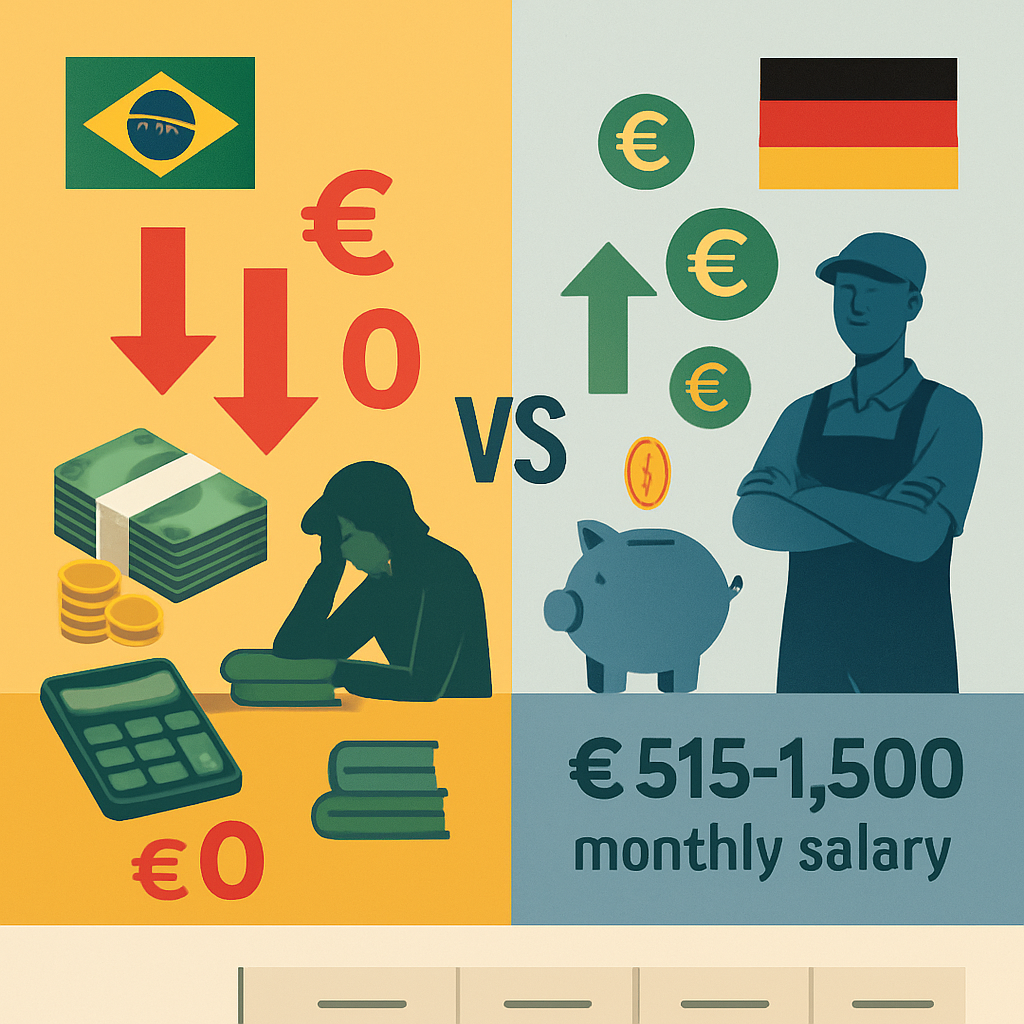
German Ausbildung Financial Model:
- Training salary from day one: €515-1,500 monthly
- Zero tuition fees
- Total earnings over 3 years: €18,540-54,000
- Subsidized housing and transportation available
| Aspect | Brazilian University | German Ausbildung |
|---|---|---|
| Tuition Costs | €7,200-31,500 | €0 |
| Monthly Income | €0 | €515-1,500 |
| 3-Year Net Position | -€21,600-63,000 | +€18,540-54,000 |
| Employment Guarantee | None | 70% retention rate |
Time to Employment and Earning Potential Comparison
Brazilian Timeline:
- 4-6 years university completion
- 6-18 months job search post-graduation
- Entry-level salary: R$2,500-4,500 (€470-850)
- Career progression often requires additional certifications
German Ausbildung Timeline:
- 2-3.5 years training completion
- Immediate employment opportunity (70% stay with training company)
- Post-Ausbildung salary: €2,800-4,200 monthly
- Clear advancement path to Meister or Techniker qualifications
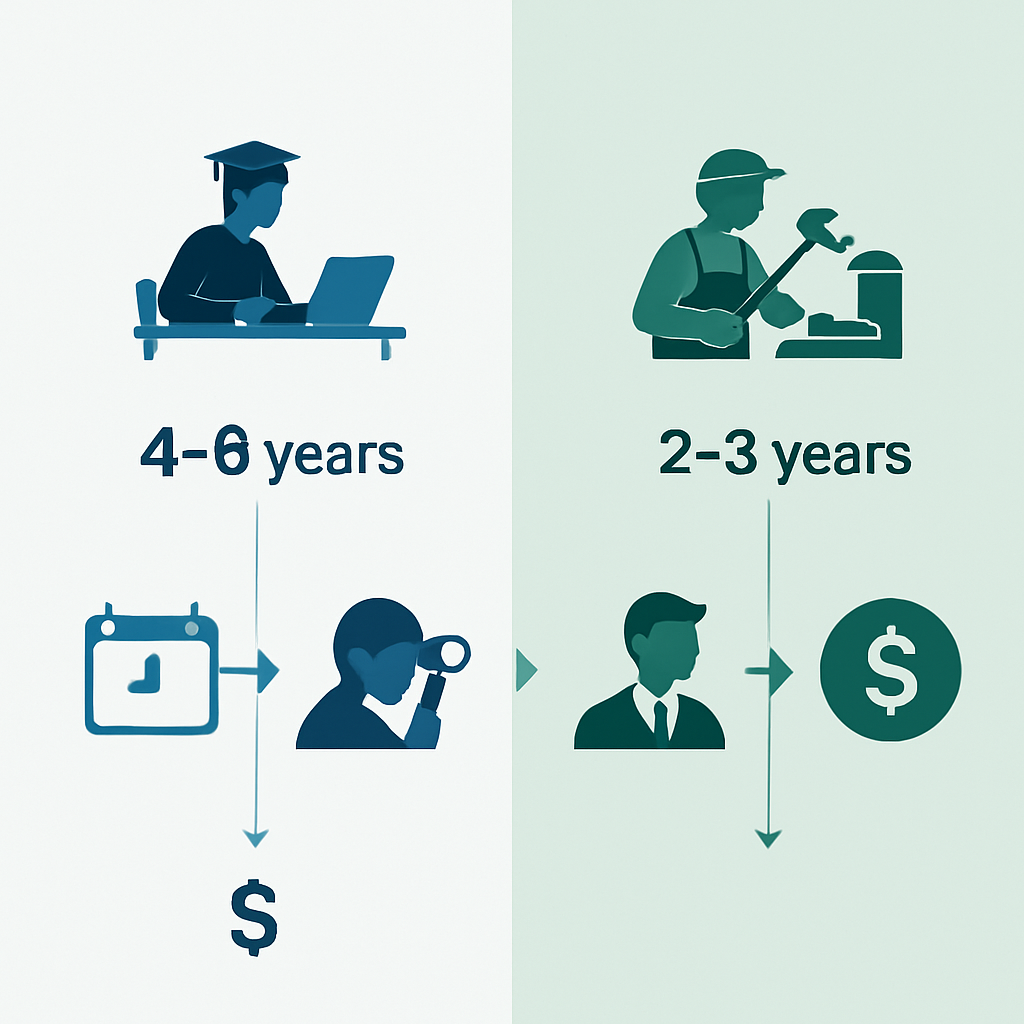
The German system provides a 2-3 year head start in professional experience while Brazilian counterparts remain in theoretical study phases.
Job Market Saturation Differences Between Countries
Brazil faces significant graduate oversupply in popular fields like business administration and law, with unemployment rates reaching 27% among recent graduates. Conversely, Germany experiences acute skilled worker shortages, particularly in:
- Manufacturing & Engineering: 150,000+ open positions
- Healthcare: 35,000+ nursing positions
- IT & Telecommunications: 96,000+ vacancies
- Logistics: 45,000+ opportunities
This demand translates to exceptional job security and advancement opportunities for Ausbildung graduates.
Navigating the Application Process from Brazil
Language Requirements and Preparation Timeline
Minimum Language Standards:
- German B1 level for most programs
- B2 preferred for technical fields
- English B2 as alternative in international companies
Recommended Preparation Timeline (18-24 months):
Months 1-6: Foundation Building
- Enroll in German A1-A2 courses
- Begin cultural orientation programs
- Research target industries and regions
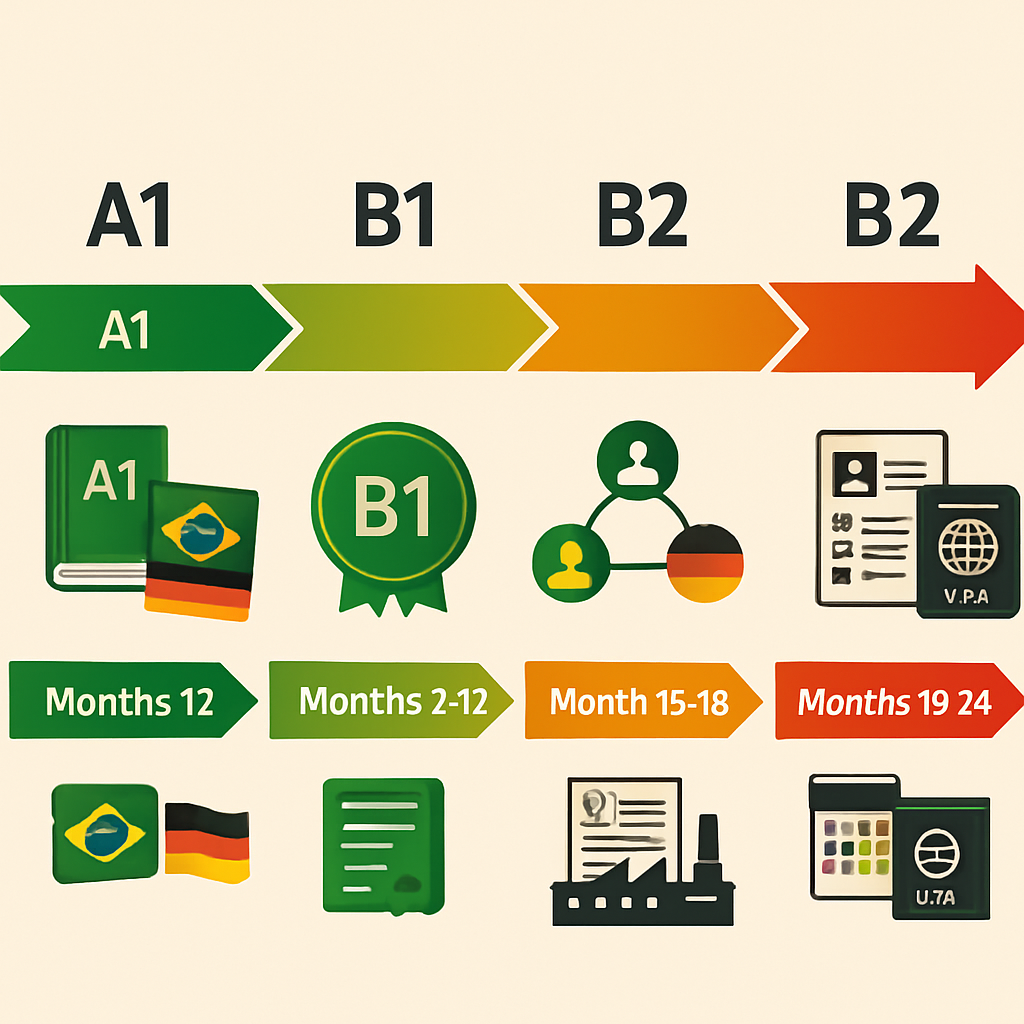
Months 7-12: Intensive Language Development
- Achieve B1 certification
- Start industry-specific vocabulary training
- Connect with German-Brazilian professional networks
Months 13-18: Application Preparation
- Obtain B2 certification
- Prepare application documents
- Begin company research and outreach
Months 19-24: Application and Visa Process
- Submit applications (typically September-February)
- Complete visa procedures
- Arrange accommodation and logistics
Documentation needed for Brazilian Applicants
Academic Documents:
- Complete secondary education certificate (Certificado de Conclusão do Ensino Médio)
- Official transcripts with apostille certification
- German translations by certified translators
Personal Documentation:
- Valid passport (minimum 3-year validity)
- Birth certificate with apostille
- Criminal background check from Federal Police
- Medical examination certificate
- Proof of financial resources (€8,640 minimum)
Professional Portfolio:
- Detailed CV in German format
- Motivation letter specific to chosen field
- Letters of recommendation
- Portfolio of relevant projects or work experience
Visa Procedures and Common Bureaucratic Challenges
Visa Application Process:
- Initial Application: Submit to German Consulate in São Paulo, Rio de Janeiro, or Porto Alegre
- Processing Time: 6-12 weeks average
- Interview: Conducted in German or Portuguese
- Decision: Approval rate exceeds 85% for complete applications
Common Challenges and Solutions:
Document Authentication Issues:
- Challenge: Apostille requirements often misunderstood
- Solution: Use certified translation services familiar with German requirements
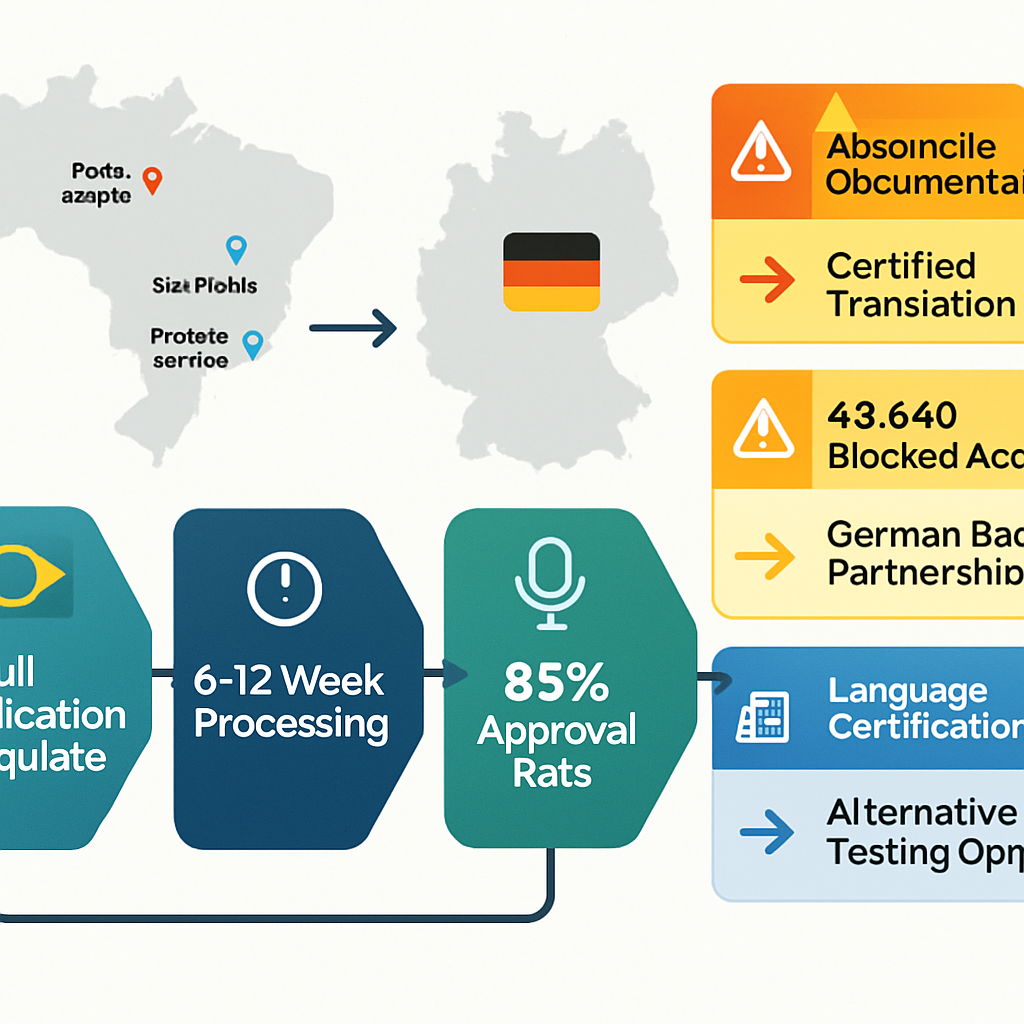
Financial Proof Complications:
- Challenge: Demonstrating €8,640 blocked account requirement
- Solution: Utilize Deutsche Bank or other German banks with Brazilian partnerships
Language Certification Delays:
- Challenge: Limited Goethe Institute testing dates
- Solution: Consider telc or ÖSD alternatives accepted by most programs
Timeline Misalignment:
- Challenge: Brazilian academic calendar conflicts with German application deadlines
- Solution: Plan applications 18 months in advance to accommodate scheduling differences
Success rates improve dramatically when applicants begin preparation 18-24 months before intended start dates, allowing adequate time for language acquisition and document preparation.
Cultural Adaptation and Living in Germany
Housing Options and Costs for Brazilian Students
Finding suitable accommodation represents one of the biggest challenges for Brazilian students entering Ausbildung programs. Most students initially choose shared apartments (WG - Wohngemeinschaft), where monthly costs range from €350-600 depending on the city. Munich and Frankfurt command the highest prices, while cities like Dresden or Leipzig offer more affordable options.
Housing Options Breakdown:
- Student dormitories: €200-400/month (limited availability)
- Shared apartments (WG): €350-600/month
- Studio apartments: €500-900/month
- Host families: €400-500/month (including meals)
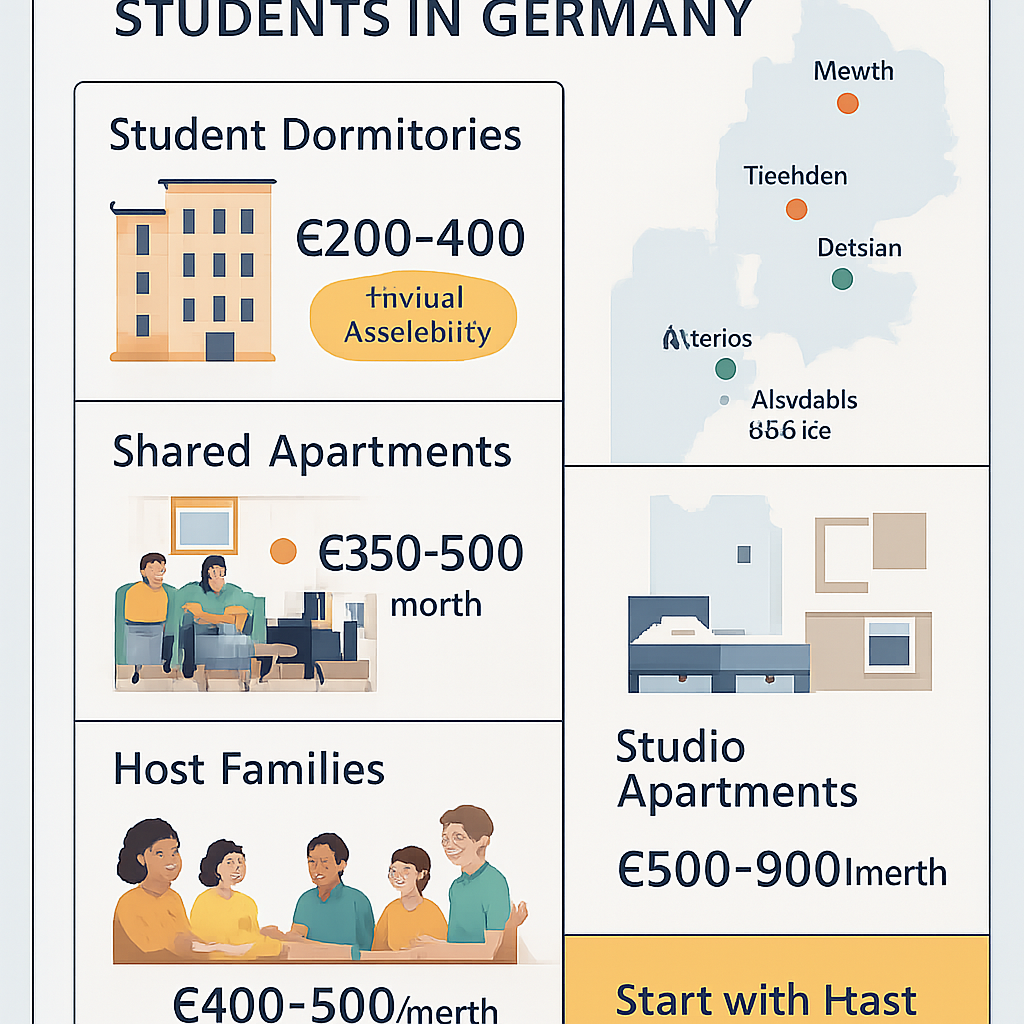
Many successful Brazilian students recommend starting with a host family for the first 3-6 months. This arrangement provides immediate cultural immersion and language practice while building local connections. After gaining confidence and local knowledge, transitioning to shared apartments becomes easier.
Workplace Culture Differences and Communication Styles
German workplace culture operates on principles that can initially surprise Brazilian students. Punctuality isn't just expected—it's fundamental. Arriving even five minutes late requires an apology and explanation. Direct communication replaces the indirect style common in Brazilian business culture.
Key Cultural Adjustments:
- Hierarchy respect: While Germans value equality, clear hierarchies exist and must be acknowledged
- Direct feedback: Criticism focuses on work performance, not personal relationships
- Structured schedules: Lunch breaks happen at designated times, typically 30-60 minutes
- Work-life boundaries: After-hours communication is generally discouraged
Brazilian students often struggle with the reduced small talk and social interaction during work hours. However, this efficiency creates opportunities for deeper relationships during designated social times like company events or Friday afternoon gatherings.
Building Social Networks and Dealing with Homesickness
Creating meaningful connections requires proactive effort. Most successful Brazilian students join local sports clubs, volunteer organizations, or cultural groups. These activities provide natural conversation opportunities and help develop German language skills in relaxed settings.
Effective Networking Strategies:
- Join Brazilian-German cultural associations in major cities
- Participate in company social events and apprentice programs
- Attend language exchange meetups (Sprachtandem)
- Engage in local sports clubs or hobby groups
Homesickness typically peaks around months 3-6. Students report that maintaining regular contact with family through video calls helps, but avoiding excessive communication prevents integration delays. Creating new traditions—like Sunday morning German bakery visits or weekend hiking trips—helps establish emotional connections to the new environment.
Financial Planning: From Application to First Paycheck
Initial Costs Breakdown (Flights, Deposits, First Months)
Brazilian students should budget €3,000-5,000 for initial settlement costs. This investment covers essential expenses before receiving the first Ausbildung salary, typically paid at month-end.
Essential Initial Costs:
| Expense Category | Cost Range (€) | Notes |
|---|---|---|
| Round-trip flights | 800-1,200 | Book 2-3 months advance |
| Housing deposit | 600-1,800 | 2-3 months rent upfront |
| First month expenses | 800-1,200 | Food, transport, basics |
| Insurance setup | 80-120 | Health insurance mandatory |
| Administrative fees | 100-200 | Residence permits, registrations |
| Emergency buffer | 500-800 | Unexpected costs |
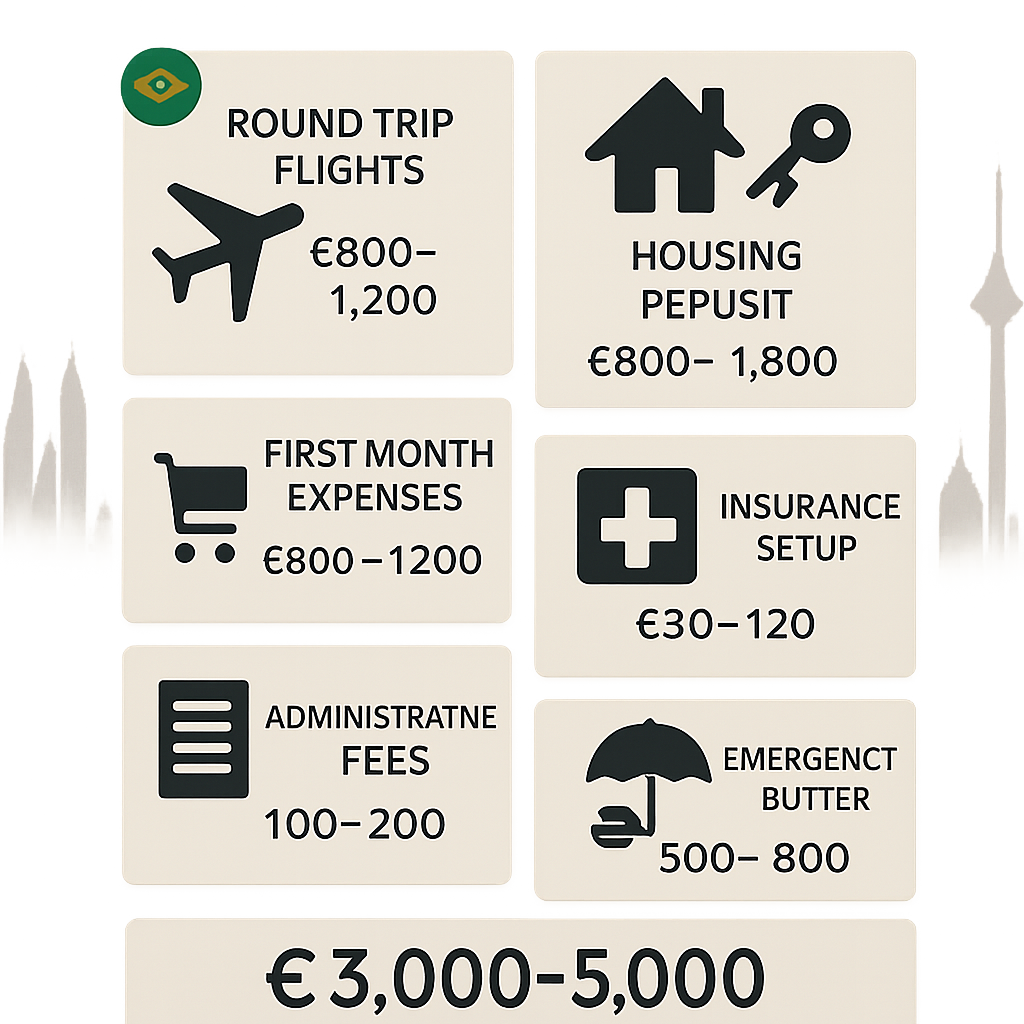
Many students underestimate administrative costs. City registration (Anmeldung), residence permit applications, and document translations can accumulate quickly. Setting aside €300-500 for these bureaucratic requirements prevents financial stress during the crucial first weeks.
Monthly Budget Planning for Major German Cities
Ausbildung salaries progress annually, starting around €515-650 in the first year and reaching €600-800+ by the third year. Combined with housing allowances (Wohngeld) and educational benefits, students can maintain comfortable lifestyles while building savings.
Monthly Budget Example (First Year, Munich):
- Income: €650 (Ausbildung) + €150 (housing allowance)
- Housing: €450 (shared apartment)
- Food: €200 (cooking at home primarily)
- Transport: €70 (student discount available)
- Phone/Internet: €25
- Miscellaneous: €55
- Savings potential: €100-150/month
Smaller cities like Erfurt or Chemnitz allow for higher savings rates, with housing costs 30-40% lower than Munich or Hamburg.
Banking, Taxes, and Financial Literacy for Brazilian Expats
Opening a German bank account requires residence registration and typically takes 1-2 weeks. Most students choose online banks like DKB or N26 for lower fees and English-language support during the transition period.
Essential Financial Setup:
- Bank account: Choose banks offering free accounts for students/trainees
- Tax identification: Obtained automatically after residence registration
- Tax class assignment: Usually Class I for single students
- Automatic savings: Set up monthly transfers to build emergency funds
German tax rates for Ausbildung students remain relatively low due to income levels and available deductions. Students can deduct work-related expenses, educational materials, and even language course costs. Many Brazilian students recover €200-500 annually through proper tax filing, making professional tax consultation worthwhile.
Industry Spotlight: High-Demand Fields for Brazilian Talent
Tech Sector Opportunities and Salary Ranges
The German tech sector presents exceptional opportunities for Brazilian students, with Ausbildung programs in IT system integration, software development, and digital marketing showing remarkable growth. Brazilian students consistently excel in these fields due to their adaptability and multilingual capabilities.
Starting Salaries by Tech Specialization:
- IT System Integration: €2,800-€3,400/month
- Software Development: €3,200-€3,800/month
- Digital Marketing: €2,600-€3,200/month
- Cybersecurity: €3,400-€4,000/month
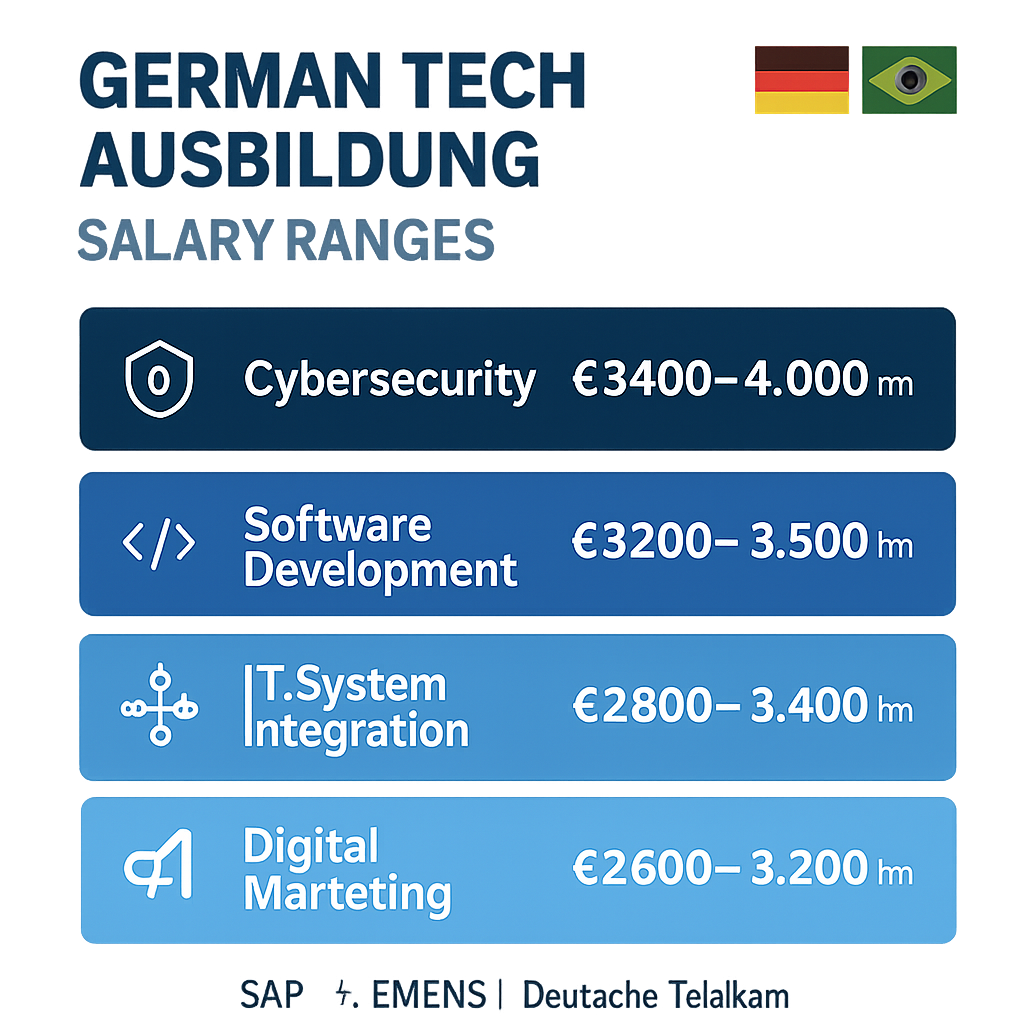
Major German companies like SAP, Siemens, and Deutsche Telekom actively recruit Brazilian Ausbildung graduates, particularly valuing their Portuguese and Spanish language skills for Latin American market expansion. The tech sector offers the fastest salary progression, with 30-40% increases within the first three years post-graduation.
Healthcare and Eldercare Growing Demand
Germany's aging population creates unprecedented opportunities in healthcare and eldercare sectors. Brazilian students bring cultural warmth and empathy highly valued in German healthcare environments.
High-Demand Healthcare Roles:
| Position | Starting Salary | 3-Year Salary | Job Security |
|---|---|---|---|
| Nursing Assistant | €2,900/month | €3,600/month | Excellent |
| Physiotherapy | €3,100/month | €3,800/month | Very High |
| Medical Technology | €3,300/month | €4,200/month | Excellent |
| Eldercare Specialist | €2,800/month | €3,500/month | Outstanding |
The healthcare sector offers exceptional job security with guaranteed employment upon completion. Many Brazilian graduates receive job offers 6-8 months before finishing their Ausbildung.
Green Energy and Sustainability Careers
Germany's commitment to renewable energy creates exciting opportunities for environmentally conscious Brazilian students. The Energiewende (energy transition) initiative drives massive investment in sustainable technologies.

Emerging Green Career Paths:
- Solar panel installation and maintenance: €3,000-€3,600/month
- Wind turbine technology: €3,400-€4,100/month
- Energy efficiency consulting: €3,200-€3,900/month
- Environmental compliance: €2,900-€3,500/month
Companies like Enercon, RWE, and E.ON actively recruit international talent, with Brazilian students particularly valued for their fresh perspectives on sustainability challenges.
Long-term Career Prospects and Permanent Residency
Career Advancement Pathways Post-Ausbildung
The German career system rewards dedication and continuous learning, offering clear advancement pathways for Brazilian graduates.
Typical 10-Year Career Timeline:
- Years 1-2: Entry-level specialist (€3,000-€3,500/month)
- Years 3-4: Senior specialist with additional responsibilities (€3,800-€4,500/month)
- Years 5-6: Team leader or project coordinator (€4,500-€5,500/month)
- Years 7-8: Department supervisor (€5,500-€6,800/month)
- Years 9-10: Management or specialized consultant (€6,800-€8,500/month)
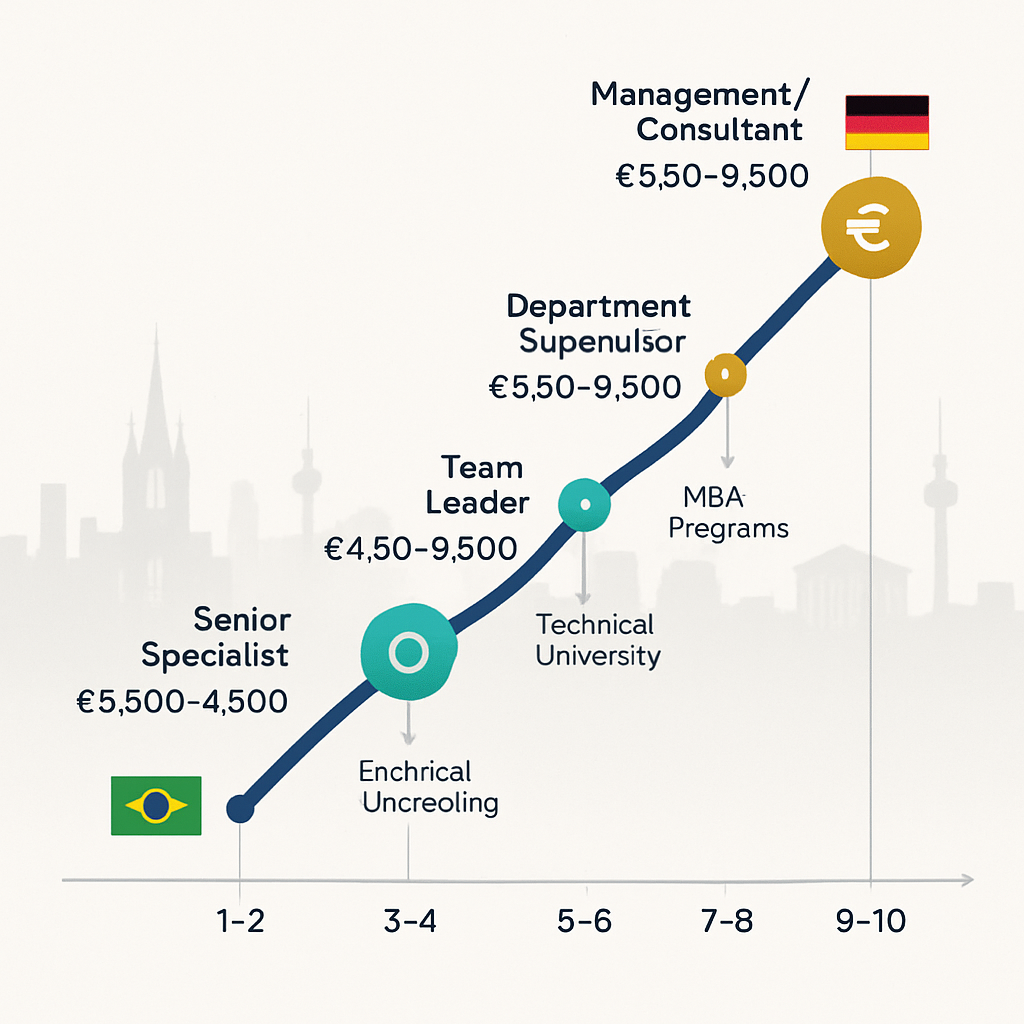
Professional Development Options:
- Meister certification (equivalent to bachelor's degree)
- Technical university admission through vocational qualification
- Company-sponsored MBA programs
- Industry-specific certifications
Requirements for Permanent Residency and Citizenship
The pathway to permanent residency becomes accessible relatively quickly for Ausbildung graduates.
Permanent Residency Timeline:
- After 2 years: Eligible for residence permit extension
- After 4 years: Qualified for permanent residence (Niederlassungserlaubnis)
- After 6-8 years: Eligible for German citizenship
Key Requirements:
✓ Stable employment for minimum 4 years
✓ B1 German language proficiency (minimum)
✓ Clean criminal record
✓ Proof of integration (community involvement, cultural knowledge)
✓ Adequate pension contributions
Building a Long-term Life in Germany vs Returning to Brazil
Advantages of Staying in Germany:
- Career stability and growth potential
- Strong social safety net
- High quality of life
- European Union mobility
- Excellent healthcare system
Benefits of Returning to Brazil:
- Family proximity and cultural familiarity
- Leadership opportunities with German experience
- Higher relative purchasing power
- Growing German-Brazilian business connections
Hybrid Approach:
Many successful graduates choose a "bridge career" - working 5-7 years in Germany to gain expertise and savings, then returning to Brazil as specialists in German companies' Latin American operations. This strategy often results in executive positions with salaries of R$15,000-R$25,000 monthly, combining German professional standards with Brazilian market opportunities.
The decision ultimately depends on personal priorities, but the Ausbildung pathway provides flexibility to choose either direction while maintaining valuable international experience and professional networks.
Frequently Asked Questions
Question 1: What are the exact upfront costs I need to prepare before applying for German Ausbildung?
Beyond the €3,000+ salary potential, you'll need €2,000-4,000 in initial expenses. This includes: language certification (€150-300), document translations and apostille (€200-400), visa application (€75), flight tickets (€800-1,200), and initial accommodation deposits (€500-1,000). Many São Paulo students work part-time for 8-12 months to save these funds. Consider applying for DAAD scholarships or the Baden-Württemberg STIPENDIUM, which can cover €500-1,000 monthly. Some companies also offer relocation assistance of €500-1,500 for promising candidates.
Question 2: How can I improve my German language skills quickly while still studying/working in São Paulo?
Start with Duolingo for 30 minutes daily, then enroll in Goethe Institut São Paulo or Instituto Cultural Brasil-Alemanha courses. Aim for A2 level minimum (B1 preferred) before applying. Join São Paulo's German conversation groups at Vila Madalena cultural centers. Watch German Netflix with Portuguese subtitles, gradually switching to German subtitles. Many successful students dedicate 1-2 hours daily for 6-8 months to reach conversational level. Online platforms like Babbel or Deutsche Welle's free courses can supplement formal classes.
Question 3: Which German cities offer the best opportunities for Brazilian students, and why?
Munich, Stuttgart, and Hamburg lead for Brazilian Ausbildung students. Munich offers 15% higher salaries but 20% higher living costs. Stuttgart excels in automotive/engineering with companies like Mercedes-Benz actively recruiting Brazilians. Hamburg provides maritime and logistics opportunities with strong Portuguese-speaking communities. Berlin offers tech opportunities and lower living costs but more competition. Consider smaller cities like Nuremberg or Mannheim for easier integration and housing availability. Research specific company locations - many automotive firms cluster in Baden-Württemberg region.
Question 4: What happens if I don't pass the Ausbildung program or want to return to Brazil early?
German Ausbildung has 85% completion rates, but challenges exist. If struggling academically, companies provide additional tutoring and language support. You can switch programs within the first year if the field doesn't suit you. Early return is possible - your visa remains valid for 3 months to find alternatives. Many students who return use their German language skills for multinational companies in São Paulo, earning 40-60% more than peers. Consider it valuable international experience regardless of completion. Some students transition to university programs using their Ausbildung experience.
Question 5: How do I maintain family connections and handle homesickness while in Germany?
Homesickness affects 70% of Brazilian students initially. Schedule weekly video calls with family (consider time differences - Germany is 4-5 hours ahead). Join Brazilian communities in German cities - most major cities have active WhatsApp groups and social events. Cook Brazilian food regularly; ingredients are available at international markets. Plan one annual visit home (budget €800-1,200) and invite family to visit Germany. Many students find host families or shared apartments with other internationals helpful for emotional support during the first 6 months.
Question 6: Can I continue to higher education in Germany after completing my Ausbildung?
Yes! Ausbildung graduates can pursue Fachhochschule (University of Applied Sciences) degrees. Your practical experience often exempts you from internship requirements. Many companies sponsor continued education while you work part-time. Popular paths include: IT Ausbildung → Computer Science degree, Mechatronics → Engineering degree, Healthcare → Specialized medical programs. German universities value Ausbildung experience highly. You'll earn while studying (€1,500-2,500 monthly) compared to traditional students. This pathway often leads to management positions with €4,500+ salaries.
Question 7: What are the most in-demand Ausbildung fields for Brazilian students in 2024?
IT Systems Integration leads demand with 95% job placement rates and starting salaries of €3,200+. Industrial Mechatronics follows closely, especially in automotive regions (€3,000-3,500). Healthcare nursing offers immediate permanent residency paths and €3,100+ salaries. Emerging fields include renewable energy technician, e-commerce specialist, and logistics management. Avoid oversaturated fields like traditional banking or retail. Research company-specific programs - SAP, Siemens, and BMW actively recruit Brazilian students. Consider dual-language programs where Portuguese skills add value, particularly in international trade companies.
Question 8: How do I handle bureaucratic processes and legal requirements as a Brazilian in Germany?
Register at Bürgeramt within 14 days of arrival - bring passport, housing contract, and Ausbildung acceptance letter. Open a German bank account immediately (Deutsche Bank and Commerzbank are foreigner-friendly). Apply for residence permit (Aufenthaltserlaubnis) within 90 days at Ausländerbehörde. Get health insurance through your employer or public providers like AOK. Obtain tax ID (Steuerliche Identifikationsnummer) automatically by mail. Keep all documents organized - Germans are strict about paperwork. Many cities offer integration courses covering legal basics. Consider hiring a Steuerberater (tax advisor) for complex situations.
Conclusion
The success stories emerging from São Paulo paint a compelling picture: Brazilian students are not just participating in Germany's Ausbildung program—they're thriving, earning €3,000+ monthly while building internationally recognized careers. Marina Santos's journey from São Paulo to becoming a sought-after IT systems integrator demonstrates that with the right preparation and mindset, the German dream is absolutely achievable. The historical ties between Brazil and Germany have created a proven pathway that thousands have successfully navigated, transforming their career prospects and financial futures in ways that seemed impossible just a few years ago.
What makes these success stories particularly powerful is their accessibility. Unlike traditional university paths that often require substantial upfront investment with uncertain outcomes, the Ausbildung system offers immediate earning potential combined with world-class training. The €3,000+ salaries these São Paulo students are achieving represent just the beginning—many graduates see their earning potential double or triple as they advance in Germany's robust economy. The combination of practical skills, language proficiency, and European work experience creates a professional profile that opens doors globally, not just in Germany.
Your next steps are clearer than ever: begin researching Ausbildung programs that align with your interests, start your German language journey immediately, and gather the necessary documentation while opportunities remain abundant. The students featured in these success stories all share one common trait—they took action despite uncertainty. Whether you're concerned about language barriers, cultural adaptation, or financial planning, remember that every successful Brazilian student in Germany once stood exactly where you are now, facing the same questions and doubts.
Don't let hesitation cost you this life-changing opportunity. The German job market continues to actively seek international talent, and Brazilian students have consistently proven their adaptability and work ethic. Contact GoAusbildung's expert advisors today to receive personalized guidance tailored to your specific background and goals. Our team has helped hundreds of students navigate this exact journey, from initial application to landing that first €3,000+ position. Your German success story could be the next one inspiring future generations—but only if you take the first step now.
About GoAusbildung
Comprehensive resource for guidance on Ausbildung programs in Germany
Ready to Start Your Ausbildung Journey in Germany?
Explore our resources and get personalized guidance to find the perfect Ausbildung program aligned with your career goals.